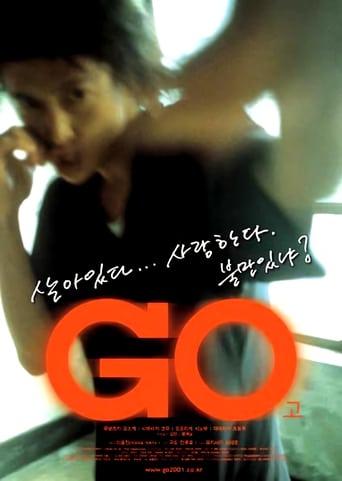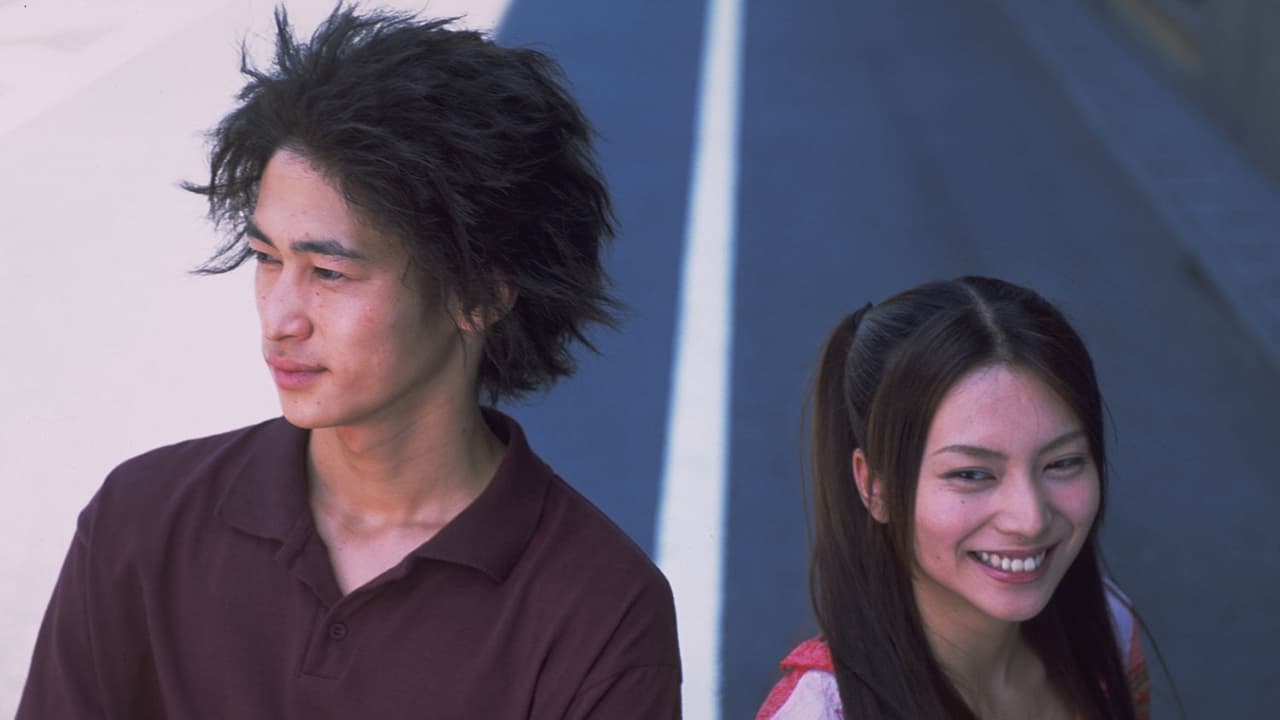Tolga H. Dur
Most reviews here reduced "Go" to a simple love story with great acting and a critique of the racist, Japanese society. I disagree, and rather think that the movie focuses on what it means and feels like to be of foreign descent in any country really. First, the love story does not take place for about the first half of the movie. Rather, the daily life of the protagonist who visits a North Korean high school and has a violent, communist father is shown. It is made clear that both sides, Japanese and Korean tell him that he is different than the ethnically Japanese. For instance, everyone who speaks a word of Japanese gets beaten up by the teacher, which, some might not believe it, is not normal or legal in Japan. From the Japanese side, a constant fear is shown. The peak of this is when a Japanese high school student kills the protagonist's old, classmate out of reaction. It gets very clear that the boy did not have any intention but rather felt afraid and intimidated by the "evil North Korean". Even the protagonist's communist father is aware of the difficulties that this stark difference brings and thus suggests him to change nationalities when having the opportunity to. The love story, which everybody seems to focus on, really takes place in the second part of the movie. It is rather another tool the director chooses to convey the feeling of being of foreign descent. It is not the object of the director to make a Bollywood-like love story, as some suggested here. To make this point clear, just think of the protagonist as ethnically Japanese. Critical scenes which made me like the movie, would not take place. The couple would not have stopped their attempt to have sex for the first time because the protagonist confessed that he is a Zainichi (Japanese. for being of Korean descent). She would not have told him that her father used to say that Chinese and Korean have "dirty" blood. He would not have to face an awkward family dinner in which the girls' father, who thought that he is Japanese), talked about how great and virtuous Japan is and how lucky they all are to be of this ethnicity.But why use a love story in the first place and not show daily microaggressions such as the American counterparts do, you may ask? The answer is because there are hardly any. The Japanese culture is very much formed by the concept of Honne and Tatamae. A person would never show his or her true face (Honne) to a stranger. You have to get very close to a person for him or her to say what is really on their mind. In addition, the protagonist puts an effort to seem as Japanese as possible. He hardly tells someone his Korean first name and instead introduces himself with his Japanese last name. As a German of European descent whose ex-girlfriend was Korean American, I can confirm with great confidence that this does not just take place in "evil, racist" Japan. I heard numerous times why I speak German so well and that I do not look Turkish because of the way I dress. I have even felt great improvements in my dating game after dying my hair brown/blondish for fun. At the end, my personal relation is maybe the reason why I liked this film so much. I, too am a Zainichi, who is not Muslim and does not agree or relate to Turkish or Muslim culture at all. Yet I am the first person who is asked to explain actions of the ISIS and the Turkish president, I know nothing about. The movie ends with a scene where the protagonist screams: "Where am I from? Why are you all afraid of me?!". I would recommend everyone to watch the movie and think of it of more than "just a love story with a critique of Japanese society".
heinen04
First of all, I loved this movie--loved it. It is a great portrayal of how strict the laws are against "aliens" in Japan. Told from the point of view of a Japan-born Korean Sugihara, Sugihara endures torment and the possibility of lost love simply because he is a Japan-born Korean. It does not matter that he attends a Japanese school (so that he is able to attend University as Korean schools are not recognized by Japanese higher education), speaks fluent Japanese, and has never even been to Korea, he will never be recognized as a Japanese citizen and thus must have his "papers" on him at all time. Despite how fresh and innovative the topic of discriminated foreigners is portrayed in the film, the female characters are discriminated against just as much as any Japan-born Korean. To put it bluntly: all of the female characters--all of them--are idiots. Sugihara's mother, while providing some comedic relief, is stupidly naive. Sakurai's mother asks questions after they've already been answered and discussed in her presence--as though she is too dim to understand. A friend of Sugihara believes everything that she is told no matter how ridiculous. Patriarchal comments are made about women such as "She couldn't cook but she was really cute." Perhaps the most disappointing female character of all is Sakurai--the main female character of the film. Apparently, even in modern-day Japanese films, the female love interest has to be a neurotic--much like many American films'female love interests. She charms the audience not through her wit or intelligence, but through her peculiarities. This would almost suffice if there was not such a let down in knowing that her attraction to Sugihara stemmed from the fact that he beat people up. A woman impressed by male strength--how original. Even in the end when Sakurai proves to think for herself after all, the beauty of her realization is upstaged by Sugihara's screaming at her. For such a brilliant, beautiful film with such clear-cut messages about being born into discrimination, there should have been at least one female character who was not discriminated into the category of being too dumb to identify with simply because she is a woman. A very big let-down for such a great work.
Leska
"This is a storyabout my love." With the movie GO young Sugihara (wonderfully portrayed by Yôsuke KUBOZUKA) tells his story-the story about his life, the story of a generation, of two nations, but most of all a story about his love. He tells his story in his own speed, his own pictures-sometimes fast forwarding (but never hectic), sometimes in slow motion, he speeds forward, he looks back, yet doesn't lose count. GO for freedom It's not easy being Sugihara--raised as a Zainichi, a Korean who lives in Japan, by a father (helplessly lost: Tsutomu YAMAZAKI) who usually speaks with his fists and who'd rather be a Spaniard, a mother (secretly unhappy: Shinobu OTAKE) who is always trying to run away and this time maybe for good; his friends live in constant war with society (and the police). Violence is a daily routine, at home and at the North-Korean school Sugihara attends, where corporal punishment is a legitimate way of teaching and speaking Japanese is strictly prohibited. So Sugihara tries to fight through, constantly angry, constantly hostile. GO for love But something changes when Sugihara starts to visit a Japanese school, to outrun his patriotic teachers and their brainwashing methods, and first meets Sakurai (lovely: Kou SHIBASAKI) who decides that he should become her boyfriend. Sugihara's attention turns from violence to Shakespeare, but the anger grows to live among people whose intolerance is only exceeded by it's ignorance. And he learns that he will have to fight for acceptance-with words, with bare knuckles and maybe all alone, because Sakurai turns away from him when she finds out he's not Japanese. But he also understands that nobody is really free from prejudices, when one night he meets a young Japanese police officer who actually listens to him. GO to fight „No soy coreano; ni soy happones; jo soy desaraigardo" (I'm neither Korean, nor Japanese, I'm just grass without roots), Sugihara explains to his father and tells him about his future plans: He wants to attend College, wants to take a chance on his life. But most of all, he wants to accept and respect himself, for that, he understands, is the necessary first step. And because GO is a film about love, Sakurai returns to him, having overcome the xenophobia indoctrinated on her by her father, giving their love another chance. GO is fast, GO has speed, GO has action, GO has humour and GO has love. Director Isao YUKISADA characterizes a generation, a society, a nation and creates something unique: he lends the desperate his voice, that is loud enough to be heard without pointing fingers. GO is like it's protagonist-fresh, energetic and hungry for life; unwilling to give in to his fate.c by Leska Beikircher
matt-559
i saw this film at the berlin film festival where it was part of the 'panorama' showings (not in the actual competition itself). it was perhaps unhelpfully billed as a film about the 'taboo of relationships between japanese and koreans'. i wouldn't say that it was particularly about that at all - more like a teenager's struggle for identity.i found it to be an excellent film. funny, touching and well-played. it deserves some international success.


 AD
AD





